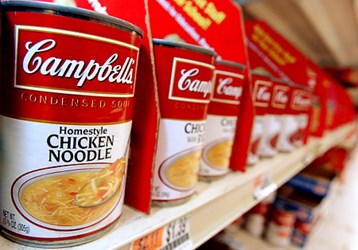Campbell Soup Company Is Being MMM MMM Good To Consumers And The Environment
By Karla Paris

Soup maker is capitalizing on its strengths to meet challenges impacting the environment, consumers, and its business through innovation, balance, and responsiveness
Corporate social responsibility was once window dressing for most companies. Now, it’s big business for brands looking to reap the rewards of sustainability. On April 22, Campbell’s highlighted its progress on its Corporate Social Responsibility (CSR) strategy during its fiscal 2013 which ended in July.
The report details Campbell’s progress against its 2020 agenda, which established the company’s CSR imperatives and four sustainability and corporate citizenship goals that include:
- Cutting the environmental footprint of Campbell’s product portfolio in half, as measured by water consumption and greenhouse gas emissions per ton of product produced
- Continuing to provide consumers with nutrition and wellness choices in Campbell’s product portfolio
- Leveraging CSR and Sustainability as key drivers of employee engagement and performance in the company’s workforce culture
A More Innovative Company
Campbell’s has been critically focused on consumer-driven innovation in products and packaging as the primary driver of organic growth. In 2013, Campbell’s grew its organic portfolio of products by acquiring Plum Organics, a brand of organic baby food and simple meals for children.
A More Balanced Company
Campbell’s drove its growth by providing a wide array of nutritious and convenient products across its consumer base. In 2013, Campbell’s enhanced the health and wellness profile of its portfolio by acquiring Bolthouse Farms, a maker of fresh carrots, packaged fresh juices, and refrigerated salad dressings. Campbell’s U.S. product portfolio offers more than 430 products low in fat, saturated fat, and cholesterol; more than 300 products with less than 100 calories per serving; and more than 150 products that provide at least a half-cup serving of vegetables and/or fruits.
A More Responsive Company
In response to consumer demand and the company’s own belief in social responsibility, last year Campbell’s reduced greenhouse gas emissions by 4.4 percent, or more than 20,800 metric tons. The company also reduced water consumption by 2.6 percent per ton of food produced. Additionally, it achieved a waste recycling rate of 83.2 percent worldwide. Campbell’s also initiated renewable energy projects and continues to streamline packaging, with a cumulative reduction of more than 65 million pounds in the company’s product portfolio over the last five years.
